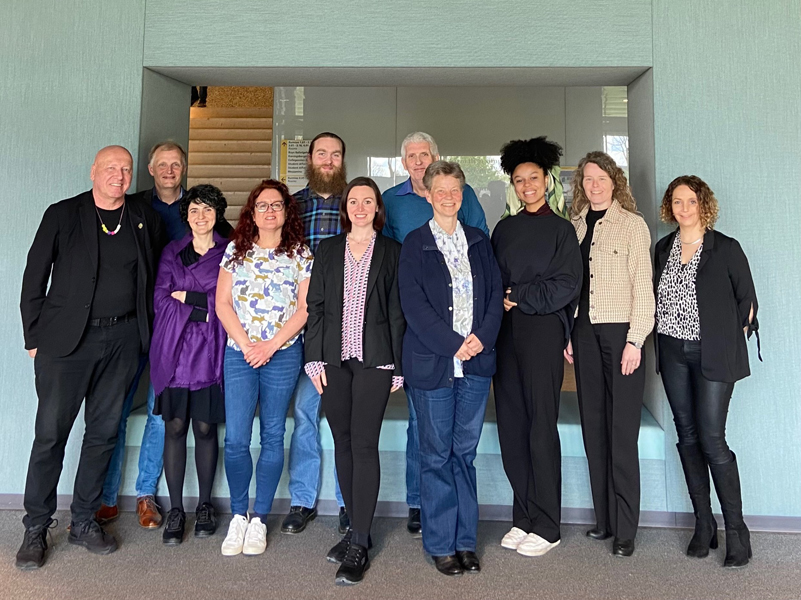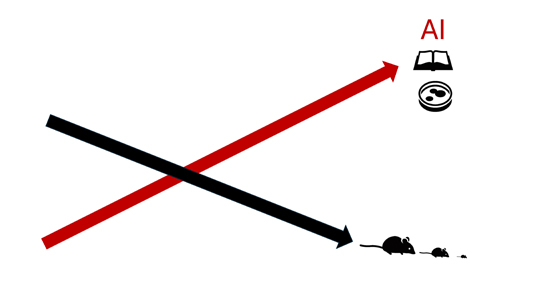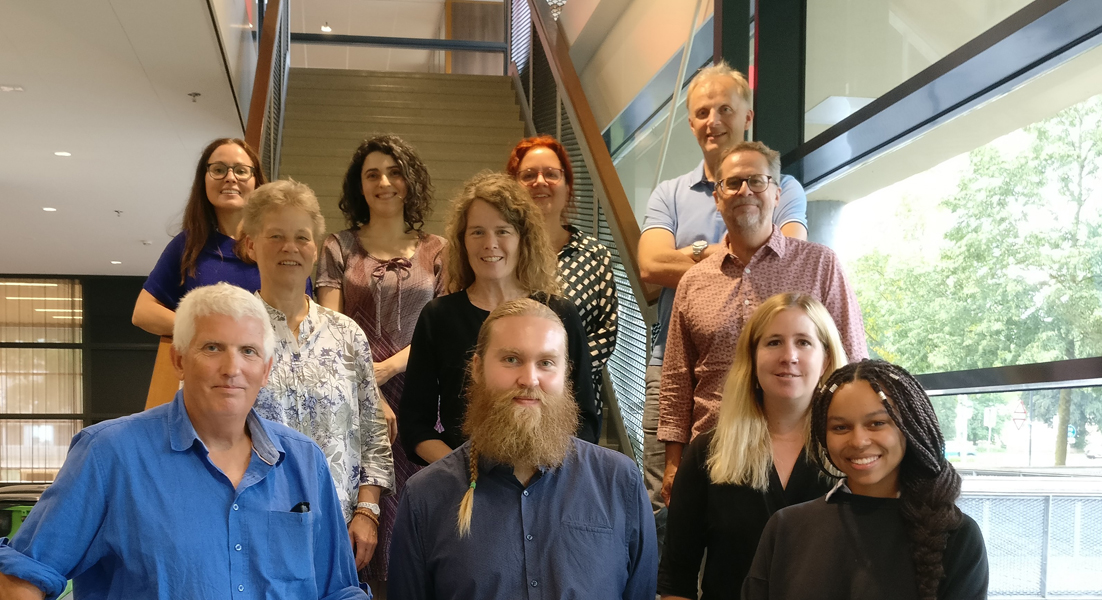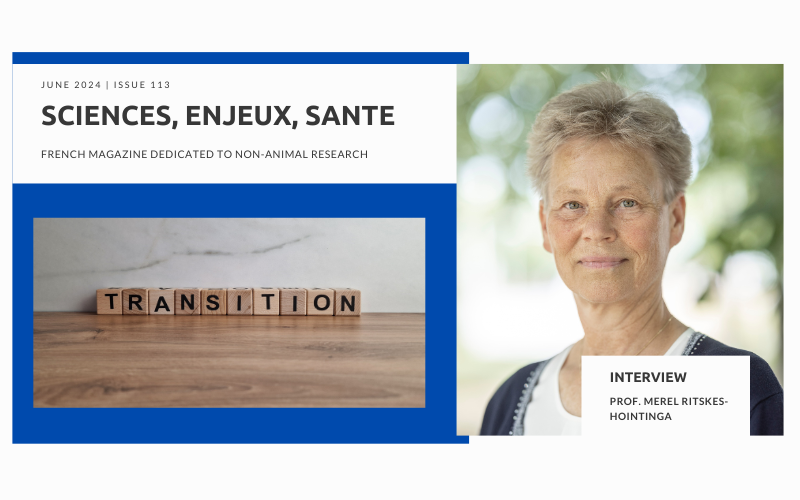
Prof. Merel Ritskes-Hoitinga
Pioneer of the transition to animal-free science
SES113 — June 2024From “swimming against the stream” to becoming a pioneer of the transition to animal-free science
Merel Ritskes-Hoitinga has been appointed Professor of Evidence-Based Transition to Animal-free Innovations at Utrecht University’s Faculty of Veterinary Medicine as of 1 June 2022. In addition, she has an honorary Skou professorship at Aarhus University in Denmark, dedicated to the promotion of evidence synthesis. After her graduation from Utrecht University as a veterinarian in 1986, her work has been dedicated to the 3Rs (Replacement, Reduction and Refinement of animal studies) In 2012, she founded SYRCLE, the SYstematic Review Center for Laboratory animal Experimentation, and she and her team organised the first international symposium in the field of preclinical systematic reviews.
The evidence resulting from systematic reviews of animal studies have been confrontational, which made her decide it was high time to make the full shift towards Replacement and the evidence-based acceleration of animal-free methodologies.
Interview
Comité scientifique Pro Anima: You are well recognised for your pioneer research within the transition to animal-free innovations. What is your story ? How and when did you become convinced that scientists should move away from animal testing?
Prof Merel Ritskes: Before graduating as a veterinarian from Utrecht University, I performed a literature study on the use of the rat in atherosclerosis research at the Department for Laboratory Animal Science. This experience made me choose to work in the field of laboratory animal science, with the aim to implement the 3Rs, improve animal welfare, quality of science and translational value of animal studies for humans. The literature review showed that many details of studies had not been described, that processes were studied in rats that did not really resemble atherosclerosis in humans, that unnecessary harsh treatments were given to rats to induce so-called atherosclerosis, and that the few publications found on spontaneous atherosclerosis in rats at an old age were hardly ever cited. I was rather shocked and wanted to do something about this, in other words, to work towards improvements.
At the time I still believed animal studies could translate well to humans, and so started my career mainly focussing on Refinement and Reduction, and not yet so much on Replacement. Refinement focuses on reducing discomfort and improving welfare of animals used in animal studies, and Reduction implies using fewer animals, e.g. by better statistics or literature studies. After graduating I did my first steps in biomedical research in Japan, and then continued to do a PhD in Refinement. Subsequently I worked for industry, and academia. In industry I learned about the Good Laboratory Practice (GLP) Guidelines, which are necessary to follow if a company wishes to bring products to the market and require regulatory approval. This taught me that GLP is a guarantee for being able to produce good quality studies and detailed reporting, and made me wish that academia would start using these guidelines as well. This last view is in general not really welcomed in academia, because GLP is often seen as unnecessary bureaucracy and restricting academic freedom. However, my experience has taught me that the level of detail prescribed by GLP is an absolute necessity to produce good quality results, and it does not limit academic freedom, as GLP only ‘tells’ you to prepare and do things well together with everyone involved!
At academia I became the head of two central animal facilities at medical faculties in Denmark and the Netherlands. This work was combined with a professorship to integrate the 3Rs in the daily management of these animal units. After decades of 3R research and education, it became clear that striving for the 3Rs is in itself not a successful endeavour, so I moved to developing education and research in systematic reviews instead.
I established the center SYRCLE (Systematic Review Center for Laboratory animal Experimentation) in 2012, when me and colleagues organised the first international conference on preclinical systematic reviews. SYRCLE has developed tools and guidelines, education, coaching and research in the field, and a special cooperative funding program with the Dutch health funder ZonMw to promote preclinical systematic reviews was started in the Netherlands.
By developing the methodology of preclinical systematic reviews and seeing the results, the evidence has made clear to me that there is an urgent scientific need for change.The (un)fortunate benefit of systematic reviews is that we detect that 50 – 80% of essential details on animal studies have not been mentioned in publications1, and more worryingly, that this hardly improves over time.This is really worrying, because the low quality of publications is now so transparent for everyone. Moreover, you cannot really judge what has been done, and whether you can interpret these results reliably. What systematic reviews also demonstrate is that many animal studies do not predict what happens in humans2, even though this is often the mentioned reason why they are executed in the first place. In drug development it is found that 90% of positive results in animal studies lead to subsequent failure in human clinical trials. For Alzheimer disease, this is a high as 99.6% failure rate! These results have made it clear to me that it would be better to start focussing on Replacement. Also because major human-relevant technological developments such as AI and organoids have been developed and have become very promising, leading to better translatable results for humans.
Moreover, this process of drug development with animal and clinical studies required by legislative bodies takes about 10 – 12 years. So all in all, this is not an efficient process, let alone the (unnecessary) suffering to animals (and humans!) caused in the process. What is also very worrying is the waste of animal lives, because so many details have not been published, so you cannot really interpret the results reliably. It is also beyond my understanding how it can be that so many animal studies are continued being published deficiently for decades, while we already have great reporting guidelines since 2010 (ARRIVE). These guidelines have been endorsed by over a 1000 biomedical journals, but have hardly led to better quality reporting of animal studies in the literature3. My conclusion is that when science is not capable of making these improvements, even when this is all made transparent, then we’d better stop doing animal studies and move to other methods. It is not ethical to use animals in studies that are not of the best quality.

SAFE Consortium — shot from April 2024 meeting
PA: Can you explain to our readers what systematic reviews are and why this approach is crucial for preclinical research and especially to raise awareness on the low quality and relevance of animal studies for human health?
Prof Merel Ritskes: The methodology of Systematic reviews (SR) has originated from clinical medicine, and is aimed at evaluating as completely, critically and objectively as possible what the already existing scientific evidence is for a certain research topic/question. Clinical systematic reviews were the answer to questions whether certain therapies would be of benefit to the patients or not, and if they were not ‘only’ originating from the belief of one individual medical doctor. In a systematic review the following steps are taken: first of all the research question needs to be formulated precisely, what do you want to know exactly? Secondly a literature search in at least two databases is performed to detect already existing information on the topic as completely as possible. Thirdly the relevant publications for the research question are selected, fourthly the study characteristics are identified and fifthly the quality of the included studies is analysed. Finally, if possible, a total statistical analysis ‑also called meta-analysis- of all the studies is performed. Since the beginning of the 1990s it has become the routine to perform systematic review of clinical studies.
Because many (non-)animal studies are done to understand and to find new treatments for human diseases, one would expect the systematic review methodology to be the routine for preclinical studies as well. As these studies are done to protect and help humans, you want to know what the evidence is before moving to humans. For drugs, you want to know whether they are effective and not toxic, at least not giving too severe side effects. It is remarkable that so far, preclinical systematic reviews are only done on a voluntary basis. They are not yet required by funding agencies, medical ethics committees nor regulatory bodies! Moreover, the low evidence there is for the predictive value of animal studies for human health has been made transparent, which indicates a clear need for change. A study on Investigator brochures, that should summarize all existing information on drugs for medical ethics committees to help base their decision making on, is largely deficient in terms of (quality and totality of) preclinical data4. In order to take these decision processes more seriously, preclinical systematic reviews should be made mandatory. This is also highly desirable when moving from animal studies to alternatives, as quality of alternatives is just as important for reliable decision making as quality of animal studies.
What I have learned from transition science is that the longer a system has been in existence, the harder it is to move away from it. And we are in the midst of that process/transition, phasing out animal studies and phasing in animal-free innovations, which turns out to be a great challenge.
PA: After years of lobbying, and the critical thinking you’ve always valued and nourished, what do you think has been your greatest achievement?
Prof Merel Ritskes: Probably my greatest achievement is that I have taken responsibility and decided to want to make changes, based on the scientific results I am finding. I could not ignore the results I produced and read in the literature. It is very challenging to walk new pathways in science, as you cannot continue with the familiar roads you have been used to. This means it takes time to start up new roads, leading first to a lower number of publications and lower success in finding new funding. And this lag time is not always valued in academia, despite that you would expect this to be otherwise, especially in this environment. I have also expressed myself critically about animal studies, which is not always valued, especially not by users of central animal facilities. It sometimes felt I had to swim ‘against the stream’. But as I had the evidence, I could not do otherwise anymore.
Through educational programs in the field of preclinical systematic reviews, a major impact has been achieved: researchers have indicated they have become aware of the shortcomings of publications on animal studies, which has given them the motivation to wanting to make changes for the better themselves, but also wishing to influence team mates, and colleagues in their own field. I think one of the greatest achievements is to make people aware and make people decide themselves they want to improve. As they say in the medical field: “once somebody has done a systematic review, he/she will do all future studies better!”. Only by telling yourself you want to change, there is a chance for success. We all know that when we tell others to make the change, this is highly likely not going to happen and sometimes even contributing to resisting change. I have met academics who think that systematic reviews limit them in their academic freedom/thinking. This is by no means true. The only thing systematic reviews do is to examine whether your great idea hasn’t been done already and is contributing to producing better, more up-to-date research questions on any topic you can think of.
Getting the evidence from systematic reviews on the table was clearly not sufficient to make fast changes. Moreover, it turned out that even well-validated alternatives to animal models were in itself not a reason for making changes (fast), such as shown for the Monocyte Activation Test (MAT) based on human blood as a Replacement for the Rabbit Pyrogen Test. Thus, understanding what the hurdles and opportunities are when making these necessary changes, is a topic for social sciences, and transition science in particular. What I have learned from transition science is that the longer a system has been in existence, the harder it is to move away from it. And we are in the midst of that process/transition, phasing out animal studies and phasing in animal-free innovations, which turns out to be a great challenge. By broadening my scope and making the move to interdisciplinary research, and cooperating with historians, social scientists and many other involved stakeholders, I have discovered new ways of doing research on how to aim towards achieving successful implementation of Replacement alternatives in practice. By focusing on current ‘ hot’ issues, e.g. the fast market approval of Covid vaccines, we learn that new, successful and flexible ways forward with fewer animal studies and more alternatives have been achieved already5,6. Lessons can be taken on board in order to use in future processes as well. Working together with my social scientist colleague Prof. Dr. Ingrid Visseren-Hamakers, we co-created new ideas with students in an experimental new teaching setting, on what would be needed to accelerate towards animal-free medical research in the perspective of transition science and transformative governance7.

X‑curve to symbolise the transition
PA: The Netherlands is unique in the world in a chosen approach for focusing on transition towards animal-free science. Do you think the significant change that we deeply wish for is going to happen anytime soon in your country?
Prof Merel Ritskes: Transition science is a very important development as it teaches us how important it is to cooperate with social sciences, and have a cross-fertilisation between social sciences and (bio)medical sciences. The Transition to animal-free innovations (TPI in Dutch) in the Netherlands is unique in that it is coordinated by the Ministry of Agriculture, Nature and Food Quality and all stakeholders working on alternatives to animal studies meet on a regular basis to discuss possible mutual actions. This has already led to significant changes in e.g. funding of ‘ other types’ of projects. I am a member of the SAFE consortium (Safety Assessment through Animal-Free Evolution), funded by the Dutch funder NWO, aimed at studying how to accelerate the transition toward Replacement, combining social and biomedical sciences. Two other, similar types of these projects have also been funded: AFARA and Valuing Testing. Also my current department (Toxicology, at the Institute for Risk Assessment Sciences, IRAS TOX) is involved in building the Virtual Human Platform 4 Safety, aiming at building a fully in silico model on the basis of human data alone. So in the future, we could make predictions for humans on the basis of in silico modelling.
Moreover, a very promising funding of 125 million euros by the Dutch government has been recently awarded to Utrecht University for building a center for animal-free biomedical translation. This is aimed to start at the beginning of 2025 and sets an example to the world, because we do have centrally financed animal units all over the world, however, there is a serious lack of these types of central facilities for alternatives.
So, promising and hopeful changes are definitely ongoing, but has not yet resulted in a clearly reduced use of animals in experiments. The Netherlands is setting the stage for transition science, but The Netherlands cannot achieve the change alone, as regulations usually work on a global scale. So we will need to do this together with other countries all over the globe. Hopefully other countries will soon follow the example of cooperating with social sciences, and building central units for supporting alternatives, so we can make the change all together. One of the important factors coming out of social science research is that stakeholders need to cooperate from the start, i.e. when a new alternative approach is being developed, it is important to cooperate with the regulators from the start of the process, in order to make sure it can become validated ‘properly’ and become accepted and implemented by the regulators.
The Netherlands is setting the stage for transition science, but The Netherlands cannot achieve the change alone, as regulations usually work on a global scale.
PA: How do you see the future and what is your greatest hope?
Prof Merel Ritskes: I think we will move together towards a future with no ‑or hardly any- animal studies anymore. Many promising initiatives are already ongoing, which I haven’t experienced before during my lifetime. In the Netherlands, the government has taken the lead in coordinating the transition toward animal-free innovations. This is a really new and hopeful step. In the past, the government would give some money to projects for the development of alternatives, but when the money stopped, the project stopped. So there was no long term planning for implementation. The current movement is different, having long term ideas and assembling the various stakeholders involved in order to keep the ball rolling. This is also in line with what the ‘public at large’ wishes for: in the EU over 1.2 million signatures were collected to ask the European Commission (EC) to phase out animal studies for chemical safety testing (European Citizen Initiative ‘Save Cruelty-Free Cosmetics — Commit to a Europe without Animal Testing’). Also the European Parliament almost unanimously passed a motion to request the same. The EC has promised to come up with a roadmap for phasing out animal studies for chemical safety assessment already in this year, 2024. The EFSA (European Food Safety Authority) has already developed a roadmap towards the development and acceptance of non-animal alternatives and the EMA (European Medicine Agency) has established a 3R working party. Not only in the EU we see these promising developments. For example, the FDA 2.0 Act was passed in December 2022 in the US, which clearly indicates that alternatives can now be accepted for drug development. A repurposed drug was already accepted for testing in clinical trials on the basis of only additional alternative tests.
The US Environmental Protection Agency (EPA) runs an active research program on the Next Generation Risk Assessment, studying how to replace the currently used animal study evaluation methods by alternative methodology and approaches. Global pharma has set guidelines to reduce animal use, e.g. Sanofi-Aventis has announced they aim to reduce animal use by 50% from 2020 – 2030, so they must see that animal studies are no longer the way forward.
My greatest hope is that regulatory bodies, governments, politicians, industry and academia worldwide will take the responsibility to keep moving towards phasing out animal studies and phasing in alternatives/NAMs fast, by setting concrete targets and milestones. I would really hope that decision-making will be done on the basis of evidence, more than beliefs and traditions and solving polarised debates that way. I hope that all involved stakeholders will keep an open mind to good dialogues and contribute to a fast and effective change to non-animal NAMs globally, for the sake of science, the planet and animals and humans.

SAFE Consortium — picture of the kick-off
- Menon JML, Ritskes-Hoitinga M, Pound P, van Oort E. The impact of conducting preclinical systematic reviews on researchers and their research : A mixed method case study. PLoS One. 2021 Dec 13;16(12):e0260619. doi : 10.1371/journal.pone.0260619. PMID : 34898637 ; PMCID : PMC8668092.
- Leenaars CHC, Kouwenaar C, Stafleu FR, Bleich A, Ritskes-Hoitinga M, De Vries RBM, Meijboom FLB. Animal to human translation : a systematic scoping review of reported concordance rates. J Transl Med. 2019 Jul 15;17(1):223. doi : 10.1186/s12967-019‑1976‑2. PMID : 31307492 ; PMCID : PMC6631915.
- Kousholt BS, Præstegaard KF, Stone JC, Thomsen AF, Johansen TT, Ritskes-Hoitinga M, Wegener G. Reporting quality in preclinical animal experimental research in 2009 and 2018 : A nationwide systematic investigation. PLoS One. 2022 Nov 3;17(11):e0275962. doi : 10.1371/journal.pone.0275962. PMID : 36327216 ; PMCID : PMC9632797.
- Wieschowski S, Chin WWL, Federico C, Sievers S, Kimmelman J, Strech D. Preclinical efficacy studies in investigator brochures : Do they enable risk-benefit assessment ? PLoS Biol. 2018 Apr 5;16(4):e2004879. doi : 10.1371/journal.pbio.2004879. PMID : 29621228 ; PMCID : PMC5886385.
- Ritskes-Hoitinga M, Barella Y, Kleinhout-Vliek T. The Promises of Speeding Up : Changes in Requirements for Animal Studies and Alternatives during COVID-19 Vaccine Approval‑A Case Study. Animals (Basel). 2022 Jul 5;12(13):1735. doi : 10.3390/ani12131735. PMID : 35804634 ; PMCID : PMC9264994.
- Ritskes-Hoitinga M. Medical regulators : look beyond animal tests. Nature. 2022 Apr;604(7907):599. doi : 10.1038/d41586-022 – 01110‑6. PMID : 35478231.
- Abarkan FZ, Wijen AMA, van Eijden RMG, Struijs F, Dennis P, Ritskes-Hoitinga M, Visseren-Hamakers I. Identifying Key Factors for Accelerating the Transition to Animal-Testing-Free Medical Science through Co-Creative, Interdisciplinary Learning between Students and Teachers. Animals (Basel). 2022 Oct 13;12(20):2757. doi : 10.3390/ani12202757. PMID : 36290142 ; PMCID : PMC9597726.
Read More
Credits : Prof Merel Ritskes-Hoitinga, Utrecht University / TPI, Safe Consortium, iStock



